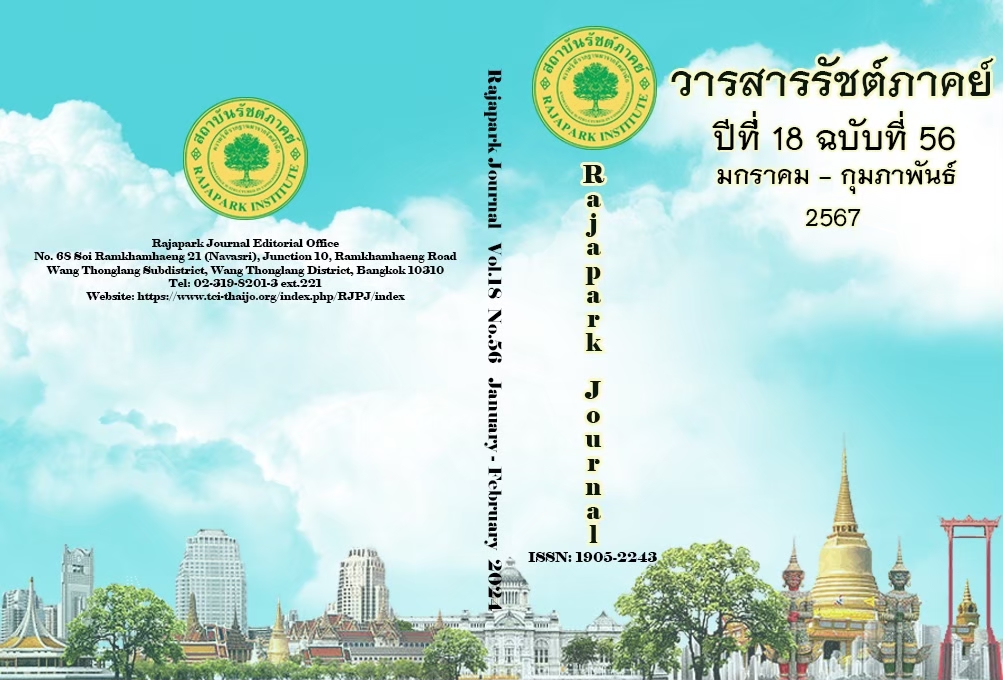The Creation of Model for the Business of Raft Accommodations in the Dams of Thailand
Main Article Content
Abstract
This research aimed to study (1) the creation of a model for the business of raft accommodations in the dams of Thailand; (2) the Thailand dams' tourist’s behavior trends; and (3) the Thailand dams' tourist’s attitudes. The researchers use mixed methods to collect data, such as the qualitative method by using a structured interview. It was found that the government and entrepreneurial sectors give the most importance to the integrated raft accommodation business model. In the quantitative method, the 800 questionnaires were deployed as a tool to collect data. The data were analyzed through descriptive statistics covering percentage, mean, and standard deviation. The inferential statistics were used to test the hypotheses, which are: (1) independent statistics; (2) one sample t-test; (3) Pearson product moment correlation coefficient; (4) Pearson chi-square; (5) contingency coefficient; (6) confirmatory hypothesis testing for population proportions with a population of 1 through the chi-square test; (7) factor analysis; (8) confirmatory factor analysis; and (9) structural equation model. The result shows that tourists have a good level of attitude towards the wellness section in the model for the business of raft accommodation in the dams of Thailand. In terms of future behavior trends, the level of recommendation of floating raft accommodation in Thailand to others is high, and tourists’ attitudes toward the business are at a good level. They should retain the business instead of building other new ones. Besides, the floating raft accommodation intergraded business model and the floating raft accommodation for wellness benefit business model are directly influenced by the behavior trend, and the floating raft combination business model is directly influenced by the attitude of the tourists in Thailand
Article Details

This work is licensed under a Creative Commons Attribution-NonCommercial-NoDerivatives 4.0 International License.
Views and opinions appearing in the Journal it is the responsibility of the author of the article, and does not constitute the view and responsibility of the editorial team.
References
Armstrong, G., & Kotler, P. (2017). Marketing: An Introduction (13th ed). Pearson.
Boonyasirinant, L. (2016). Creative Tourism Development Guidelines for Sustainable Ecotourism Business in Thailand. Ratchabhat University.
Channopparat, P. (2019). A Study of Tourists’ Behaviours Trend of Future. Mahidol University. https://archive.cm.mahidol.ac.th/handle/123456789/3078
Chuanchom, J. et al. (2013). The Relationship Between Traveler’s Decision Making in the Choosing A Resort and Resort Marketing Mixed Management in The Khao Kao District, Petchabun Province. Journal of Services and Thai Tourism, 8(2), 23-25. https://so04.tci-thaijo.org/index.php/tourismtaat/article/view/15418
Department of National Parks, Wildlife and Plant Conservation. (2018). The Numbers of Thai Tourism who Tervel in National Park Area. http://it2.dnp.go.th/en/
Hayes, D.K., Ninemeier, J.D., & Miller, A.A. (2017). Hotel Operations Management (3th ed). Pearson.
Jentrekulroj, V., Pangkesorn, A., & Boonpalit, A. (2017). The Design Guideline for Ecological Friendly Resorts. Veridian E-Journal, Silpakorn University, 10(3), 2641-2652. https://he02.tci-thaijo.org/index.php/Veridian-E-Journal/article/view/133354
Kasikorn Research Center. (2019). Trends and Business Analysis. https://www.kasikornbank.com/th/business/sme/ksmeknowledge/article/ksmeanalysis/pages/competitive-hotel-industry.aspx.
Kerin, R., & Hartley, S. (2022), Marketing: The Core (9th ed). McGraw-Hill.
Kotler, P., & Armstrong, G. (2018). Principle of Marketing (17th Global ed). Pearson.
Kotler, P., Keller, K. L., & Chernev, A. (2022). Marketing Management (16th ed.). Pearson.
Kumar, V. (2012). 101 Design Methods: A Structured Approach for Driving Innovation in Your Organization. Wiley.
Maslow, A. H. (1970). Motivation and Personality (2nd ed.). Harper and Row.
Ministry of Tourism and Sports. (2018). The Tourism Development Strategic Pan 2018-2021. Department of Tourism, Ministry of Tourism and Sports, Thailand.
Schiffman, L.G., & Wisenblit, J. (2014). Consumer Behavior (11th ed.). Prentice Hall.
Singjawala, W. (2011). Development guidelines for standardizing the raft guesthouse in Thailand. Suan Dusit Ratjabhat University.
Tesprasit, K. (2020). Behavioral Study of Wellness Tourism and Optimization of Hotels: A Case Study of Tourist Insterested in Staying at Small Hotels in Chantaburi Province. Chulalongkorn University. https://digital.car.chula.ac.th/chulaetd/4131
UNWTO. (2018, September 11). UNWTO Tourism Highlights: 2018 Edition. https://www.unwto.org/global/publication/unwto-tourism-highlights-2018-edition


